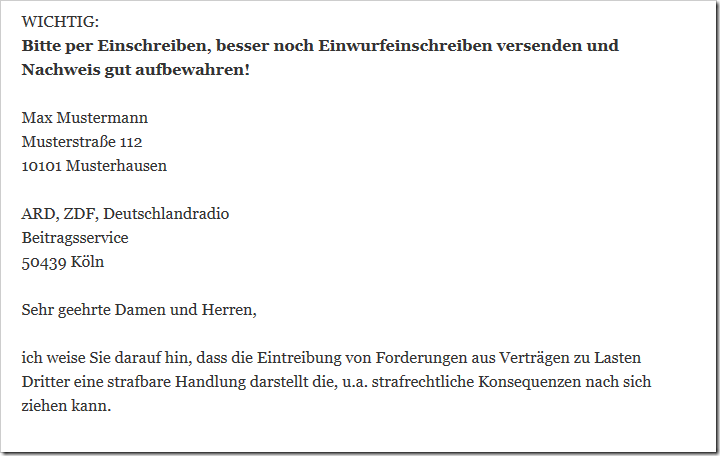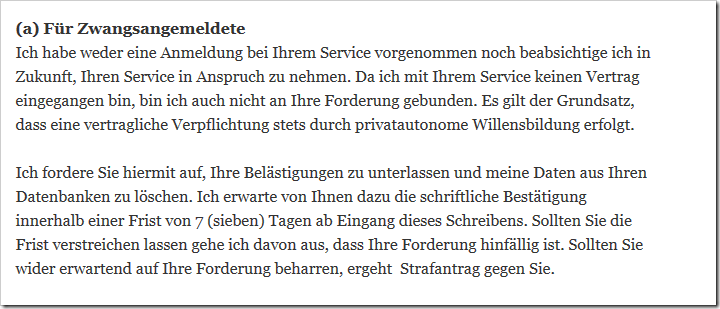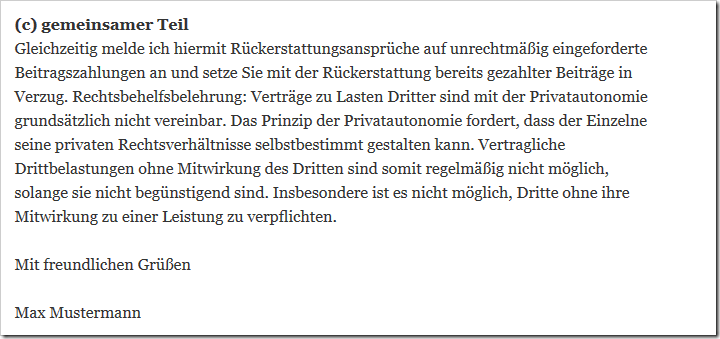First of all, the following should be said: It is of course clear that the GEZ - i.e. the fee collection center - no longer exists in this form.
But the changed name to “ Contribution Service ARD, ZDF and Deutschlandradio ” is ultimately just a new ball gown for an attraction that is perceived as rather annoying in Germany. I will still use the name GEZ throughout the article.

Now what about the GEZ?
In the course of this article we will highlight the most important things. In particular, things that internet users (mostly on Facebook) have sent to us. We shed light on the position of the GEZ and how it should be assessed legally - in a way that everyone can understand. Even without a law degree.
First of all: The GEZ itself was written to requesting a statement on these questions. An automatic response required a long wait (about 4 weeks). These are now over. If the GEZ still gets in touch, the answer will of course also be submitted here!
To make one thing clear:
here that said all those who refused to pay would now have to go to jail. This is of course complete nonsense! This is a normal civil law claim. This is what the writing itself reveals:

This is a FORCED ENFORCEMENT MATTER!
It now also says: This is about forcing people to submit financial statements. Ie not, as the article suggests, that if you don't pay, the GEZ just goes along and locks everyone up.
It simply means: The GEZ uses the normal civil law process to claim the money . A wealth report only affects those who cannot pay .
Here you state what assets you have. And this checks for seizable assets. So if you have something against the seizure of objects and assets (such as life insurance), it is not the GEZ that is responsible for it but the current legal regulations on seizure.
The GEZ only uses the channels that are open to a creditor. And apart from that: With the sum, which unfortunately wasn't blacked out, you can see an outstanding amount of 615.16 euros. If you count the monthly rate of around 18 euros, then this person would not have been allowed to pay for 34 months.
Minus perhaps reminder costs and other costs incurred - you are definitely more than 23 months. So these are more old debts. It is very questionable whether the amount owed has anything to do with the new amount.
Because: a foreclosure order will not come about that quickly . Especially since an arrest warrant from a bailiff is not issued after the first unsuccessful attempt to contact you. It's just a guess though. However, please note:
The foreclosures require the following steps:
- A debtor must be in default of payment
- This debt must be reminded (with a deadline)
- If the deadline has expired, an attempt will be made to obtain a title in a local court.
Here the district court's review is not as precise as one might hope. But with the “yellow” letter you will receive a so-called objection instruction. There are then two cases here: a.
You do not file an objection: the creditor (here: GEZ) receives a title that is enforceable for 30 years. b. You file an objection: a civil law procedure ensues, at the end of which a decision is made as to whether the claim is legal - or not. - If the claim is legal, you can have the title you receive enforced. This is carried out by an enforcement officer (here bailiff). If you do not report to the bailiff, he is obliged to obtain the affidavit.
If you refuse to provide this insurance, a bailiff will apply for an arrest warrant.
This is justified by the fact that this insurance was not provided. If you give this insurance, your freedom will be restored IMMEDIATELY.
And not every bailiff immediately takes a creditor to prison. As happened here: The bailiff already has an arrest warrant and gives the debtor another chance to provide the insurance.
Conclusion:
The report contains a lot of half-truths and half-knowledge and is used to incite against the GEZ. The GEZ itself follows the normal civil law route, which is legitimate in its form. Especially since it is doubtful that these are claims from the new contribution.
Now you can ask yourself: Wait a minute, if the GEZ takes the civil law route... Then it is a company standardized in §14 BGB. Or not?
We have also received inquiries about this. The GEZ is supposed to be a standardized company in accordance with Section 14 of the German Civil Code (BGB).
The GEZ is supposed to be a standardized company in accordance with Section 14 of the German Civil Code (BGB) . Therefore, the following quote from a letter that we have in PDF format would be logical, in which it says:
“Contracts at the expense of third parties are fundamentally incompatible with private autonomy and are consequently not provided for in the BGB. Contractual third-party burdens without the involvement of the third party are therefore generally not possible. In particular, it is not possible to oblige third parties to perform a service without their cooperation." And further: "The principle that contracts fundamentally only entitle and oblige the contractual partners and not third parties has legal support in Section 311 Paragraph 1 of the German Civil Code (BGB), which stipulates that a contract 'between the parties' is required to establish a non-obligatory relationship.”
That is correct so far.
The problem: GEZ is not a company under private law . The imprint on its own site states: “ ARD ZDF Deutschlandradio Contribution Service is a public, unincorporated joint institution of the state broadcasters, ZDF and Deutschlandradio, which are members of the Association of Public Broadcasting Corporations of the Federal Republic of Germany (ARD), for the purpose of collection of broadcasting contributions according to the State Treaty on Broadcasting Contributions .”
(Source: http://www.rundfunkteil.de/impressum/index_ger.html )
And this is where the GEZ's claim comes from: the state treaty. Now you can definitely say:
Wait a moment. State contract? I thought the broadcasting companies were a state and not a federal matter?
This is also completely true! There are also some complaints there! Most recently before the Bavarian Constitutional Court. It was argued here that the fees would act like a tax. But taxes are a federal matter.
But the GEZ is a state matter and this would contradict that. The Bavarian Constitutional Court saw this differently and recognized the current fees as constitutional in its ruling from February 2014 (if you are interested: ruling: http://www.bayern.verfassungsgerichtshof.de/8-VII-12;%2024-VII-12.html ) a guiding principle of the judgment states:
“The provisions of the State Broadcasting Fee Treaty on the collection of a broadcasting fee in the private sector for every apartment (Section 2 Paragraph 1 RBStV) and in the non-private sector for business establishments (Section 5 Paragraph 1 RBStV) and for motor vehicles (Section 5 Paragraph 2 Sentence 1 No. 2 RBStV) are compatible with the Bavarian Constitution.”
So the GEZ's basis for claims can already be found here. And if someone has a basis for a claim, they can also be enforced under civil law!
Therefore, this article, which calls for a legal basis, makes no sense.

The state treaty is the legal basis . It is strange when one rejects the legal basis in the form of the state treaty - but often also refers to it when it comes to, for example, the educational mandate.
By the way: It is entirely possible to make a claim without a signature. For this purpose, you should §126 BGB , which is probably referred to, after the first paragraph. §126 III BGB provides further information.
Source: dejure.org
For better understanding:
In jurisprudence there is a kind of “ ranking ” of laws. If we ignore European laws, the Basic Law (GG) is at the top.
Here, too, there are arguments that are intended to justify against constitutional conformity.
CONTINUE TO PAGE 3: Various reasons are given for pages on the volksbetrug.net site.
Above all: Various reasons are given for pages volksbetrug.net
This is what it says here:
“Since the law does not provide for any exemption due to low income, it not only violates, as mentioned, Article 5, Paragraph 1, Sentence 1, Second Half of our Basic Law.”
If you now look at Article 5 I 1 2.HS GG it says: “Everyone has the right […] to obtain information from generally accessible sources without hindrance.”
Source: dejure.org
Completely correct objection.
But that's exactly what public broadcasters do. Because: It does NOT mean (!!!) that it has to be free! You also pay for a cable connection.
The following example can be cited as particularly important: In a tenancy dispute, the question arose as to whether a tenant could install a parabolic antenna. The landlord didn't like the aesthetics.
The tenant also invoked freedom of information. And that was the crux of the matter: the tenant's freedom of information in accordance with Article 5 or property rights in accordance with Article 14 of the Basic Law.
The court stated: The tenant has the fundamental right to find out about world events in his native language via a television.
BUT: It doesn't HAVE to be free. Since there are also offers via cable, you can also use these. And this is consistent case law. It doesn't occur to anyone that they no longer pay for newspapers and the Internet in order to be able to comply with freedom of information.
It goes on to say on volksbetrug.net:
“but also against the welfare state principle of Article 20 Paragraph 1 of the Basic Law and Article 28 Paragraph 1 Sentence 1. The welfare state principle aims to achieve a balance between conflicting interests and to enable tolerable living conditions for everyone. It stands for social justice and the granting of a humane minimum subsistence level.”
That is also true - but unfortunately the consequences were not recognized.
There is the possibility of obtaining an financially unreasonable .
Of course, one can argue that the subsistence level is drifting away from “financial unreasonableness.” But that's exactly not what's happening here . The opportunity is being denied here - that's not right.
Furthermore, only examples are given of how the educational mandate is not being carried out. However, this is a matter that requires your own opinion.
In order to maintain our neutrality, we will not comment on this.
Everyone knows the program of the public broadcasters and can and should (and should) have their own opinion about it.
It is questionable whether the answer the gentleman received is correct. Unfortunately, we did not receive an answer when we asked Mr. Höcker ! It is more likely that he was successful because of the aforementioned financial unreasonableness. But that is pure speculation.
Conclusion: The constitutionality is supported with good arguments.
I myself carried out a fundamental rights examination as part of my studies and came to a different conclusion than the Bavarian Constitutional Court (albeit at the federal level of the GG). This question will probably be decided in Karlsruhe (Federal Constitutional Court).
The possibility of contacting the European Court of Justice would also remain if the Federal Constitutional Court were to affirm the constitutionality. But this does not seem to be apparent at the moment. Many people strongly believe that this will still be decided in Karlsruhe.
GO TO PAGE 4: ARD/ZDF – Resistance to the broadcasting fee.
Last but not least, we often receive inquiries about a report from the “Federal Ministry of Finance”.
Not only did I work through this, but so did a Mr. Nickles. Here: “ ARD/ZDF – resistance to the broadcasting fee ” These are supposed to be his findings that he read from the report.
Source: nickles.de
Mr. Nickles quotes:
„The technical reasons that once justified the public broadcasting system have largely faded today.”
He then states that this report should contain reasons for the lawsuit and boasts that he ordered 100 copies free of charge.
It's a shame that Mr. Nickles doesn't take into account that a federal ministry is financed by taxes. So it wasn't him - we all paid for his 100 copies.
I call it something else for free. But whoever is happy about it. If you want, you can also read this document yourself. You can download it as a PDF: http://www.bundesfinanzministerium.de/Content/DE/Downloads/Broschueren_Bestellservice/2014-12-15-gutachten-medien.html
Of course, I also looked at and worked through this document.
The arguments go towards the type of financing. What we are talking about here is cost efficiency. E.g. It is mentioned that advertising on public broadcasters is not the best.
Here, as can be seen, there may be a distortion of competition. On the one hand: How can one report negatively about companies that help finance their own channels by placing advertising there?
The modernization of technology also ensures that costs can be reduced. This is hardly taken into account and there is criticism that the public sector does not keep costs efficient.
This also becomes clear when you look at the figures in which the costs of public broadcasters from some countries are compared with those from Germany.
Here Germany is very high in terms of financial opportunities. I can recommend reading this report to anyone who is interested. Our report should not go too far and everyone can form their own unbiased opinion.
GO TO PAGE 5: Anonymous paralyzes the GEZ.
Last but not least we have Anonymous.
Anonymous paralyzes the GEZ. This is nothing more than a call to boycott the GEZ with the following letter:
Source: Postswitch.de
“I would like to point out that the collection of claims from contracts at the expense of third parties is a criminal offense which can, among other things, result in criminal penalties.”
That's right. It's completely irrelevant here, since you're addressing someone who has legitimate demands. And you can proceed further optionally.
Source: Postswitch.de
You can remember these lines if a lawyer contacts you again with fraudulent intent due to any dubious claims. However, everything is fine here. From a purely legal perspective, the demand is still legal and therefore legitimate. The police must pursue a criminal complaint on behalf of the public prosecutor's office, but I can assure you that this will be dropped immediately if none of the employees intentionally commits crimes that are standardized in the Criminal Code. It would therefore be pointless. The demand would simply shift backwards and increase.
Source: Postswitch.de
Again, that is not correct. Similar to above. A return funding would be pointless.
It is also often claimed that you can pay subject to the legal assessment and its standing. It is entirely possible that you pay with reservations. But whether you will see even a small part of your money again if you “win” in Karlsruhe is still very questionable.
Source: Postswitch.de
True again – just not in this case! It becomes clear that none of the people who give tips here have even given a lecture in a lecture hall in which a Prof. Dr. jur. was present, sat.
And that can have fatal consequences, as civil dunning proceedings can be initiated.
In summary it can therefore be said:
- From a legal point of view, GEZ's demands are completely correct.
- There are hardly any options to defend yourself against it.
- The constitutionality is – quite rightly – questioned. But as long as there is no ruling against it, the claim is legally valid.
- Everyone has the opportunity to apply for an exemption. However, this is subject to high requirements.
Important to mention:
Here only the legal components were highlighted and something was said about them.
It is NOT the case that this is intended to be an opinion or statement about whether the GEZ is “good” or not.
Nor can we say how to avoid the fees. For this to happen, the fees would have to violate the constitution - and that can only happen through a judgment before the Federal Constitutional Court!
The fact is that it is important that we have public broadcasters that can - if not MUST - express themselves freely and neutrally on all facts and take on the task of educating about politics and current world events.
These must be freely financed in order to maintain independence. The extent to which “our” public service meets this standard is a matter on which everyone should have their own opinion - we will not give any!
Author: Marcel, mimikama.org
Notes:
1) This content reflects the current state of affairs at the time of publication. The reproduction of individual images, screenshots, embeds or video sequences serves to discuss the topic. 2) Individual contributions were created through the use of machine assistance and were carefully checked by the Mimikama editorial team before publication. ( Reason )








